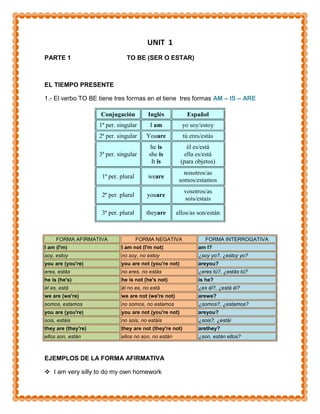
To Be (Ser o Estar
- 1. UNIT 1 PARTE 1 TO BE (SER O ESTAR) EL TIEMPO PRESENTE 1.- El verbo TO BE tiene tres formas en el tiene tres formas AM – IS – ARE Conjugación Inglés Español 1ª per. singular I am yo soy/estoy 2ª per. singular Youare tú eres/estás he is él es/está 3ª per. singular she is ella es/está It is (para objetos) nosotros/as 1ª per. plural weare somos/estamos vosotros/as 2ª per. plural youare sois/estais 3ª per. plural theyare ellos/as son/están FORMA AFIRMATIVA FORMA NEGATIVA FORMA INTERROGATIVA I am (I'm) I am not (I'm not) am I? soy, estoy no soy, no estoy ¿soy yo?, ¿estoy yo? you are (you're) you are not (you're not) areyou? eres, estás no eres, no estás ¿eres tú?, ¿estás tú? he is (he's) he is not (he's not) is he? él es, está él no es, no está ¿es él?, ¿está él? we are (we're) we are not (we're not) arewe? somos, estamos no somos, no estamos ¿somos?, ¿estamos? you are (you're) you are not (you're not) areyou? sois, estáis no sois, no estáis ¿sois?, ¿estái they are (they're) they are not (they're not) arethey? ellos son, están ellos no son, no están ¿son, están ellos? EJEMPLOS DE LA FORMA AFIRMATIVA I am very silly to do my own homework
- 2. I am a fool because I dont have brain My teacher is a silly because I lie about my homework EJEMPLOS DE LA FORMA NEGATIVA My mother isn't pretty My father isn't my dad I am not son of my dad EJEMPLOS DE LA FORMA INTERROGATIVA Are you in the office? Are the children happy? Is brother a doctor? EL TIEMPO PASADO DEL VERBO TO BE El verbo to be tiene las siguientes formas en el tiempo pasado WAS- WERE FORMA AFIRMATIVA FORMA NEGATIVA FORMA INTERROGATIVA I was I was not (I wasn't) was I? no fui, no era / no estuve, no ¿fui?, ¿era? / ¿estuve?, fui, era / estuve, estaba estaba ¿estaba? youwere you were not (you weren't) wereyou? no fuiste, no eras / no estuviste, no ¿fuiste?, ¿eras? / ¿estuviste?, fuiste, eras / estuviste, estabas estabas ¿estabas? he was he was not (he wasn't) was he? no fue, no era / no estuvo, no ¿fue?, ¿era? / ¿estuvo?. fue, era / estuvo, estaba estaba ¿estaba? wewere we were not (we weren't) werewe? fuimos, éramos, / estuvimos, no fuimos, no éramos, / no ¿fuimos?, ¿éramos? / estábamos estuvimos, no estábamos ¿estuvimos?, estábamos youwere you were not (you weren't) wereyou? no fuisteis, no erais / no estuvisteis, ¿fuisteis?, ¿erais?, / fuisteis, erais, / estuvisteis, estabais no estabais ¿estuvisteis?, ¿estabais? theywere they were not (they weren't) werethey? no fueron, no eran / no estuvieron, ¿fueron?, ¿eran? / ¿estuvieron?, fueron, eran / estuvieron, estaban no estaban ¿estaban? EJEMPLOS The house was not white (la casa no esblanca) I was a student. (era alumno.) Youwerehappy. .(eras feliz.) He was a musician . (fue músico.)
- 3. She was in the car. (estaba en el coche.) Itwas a hotday. ? (Era un día caluroso) EL TIEMPO FUTURO DEL VERBO TO BE AFIRMATIVA NEGATIVA I (shall / will) not Yo no jugaré I (shall / will) play Yo jugaré play Tú no jugarás You will play Tú jugarás You will not play Él no jugará He will play Él jugará He will not play Nosotros no We (shall / will) Nosotros We (shall / will) not jugaremos play jugaremos play Vosotros no You will play Vosotros jugareis You will not play jugaréis They will play Ellos jugarán They will not play Ellos no jugarán ORACIÓN AFIRMATIVA I will be a teacher = Yo seré una profesora ORACIÓN NEGATIVA I will not (won't) be a teacher = Yo no seréunaprofesora ORACIÓN INTERROGATIVA Will I be a teacher? = Seré yo una profesora? Yes, I will / No, I won't = Si sere / No, no seré ABECEDARIO EN INGLÉS El abecedario en inglés con pronunciación: A = (ei) N = (en) B = (bi) O = (ou) C = (ci) P = (pi) D = (di) Q = (kiu) E= (i) R = (ar) F = (ef) S = (es) G = (yi) T = (ti) H = (eich) U = (iu) I = (ai) V = (vi) J = (yei) W = (dabliu) K = (key) X = (ex) L = (el) Y= (uai) M = (em) Z = (zi)
- 4. UNIDAD 2 PARTE1: THERE TO BE (HABER, EXIXTIR) Significa 'haber' (de existir). There + be se utiliza para hablar acerca de la existencia de algo, por lo tanto, ubicamos el sujeto real después del verbo. There is -hay (singular) There are - hay (plural) There was - hubo, había (singular) There were - hubo, había (plural) There is a lighthouse on the beach. Hay un faro en la playa. LA FORMA NEGATIVA SE EXPRESA CON THERE IS/NOT / THERE ISNT O THERE ARE NOT / THERE AREN´T Examples: There isn't a telephone in the kitchen. No hay teléfono en la cocina.. . There is a orange in thetable Esta una naranja en la mesa EN FORMA INTERROGATIVA Is there a balcony in the flat? ¿Hay balcón en el departamento? Is there a Post Office near hear? ¿Hay un correo cerca de aqui? Yes, there is Sí, hay No, thereisn't No, no hay Las palabras SOME (algo ,algunos ) solamente se usa en forma afirmativa En las interrogaciones se debe usar la palabra ANY En la forma negativa se puede usar NOT ANY
- 5. EXERCISES: There are some tres in the garden There is not any water in the glass Is there any wather in the glass El uso de LITTLE(pocos ) y A LOT OF (bastantes) EJEMPLOS There a lot of ice in my glass There a very little water in the glass
